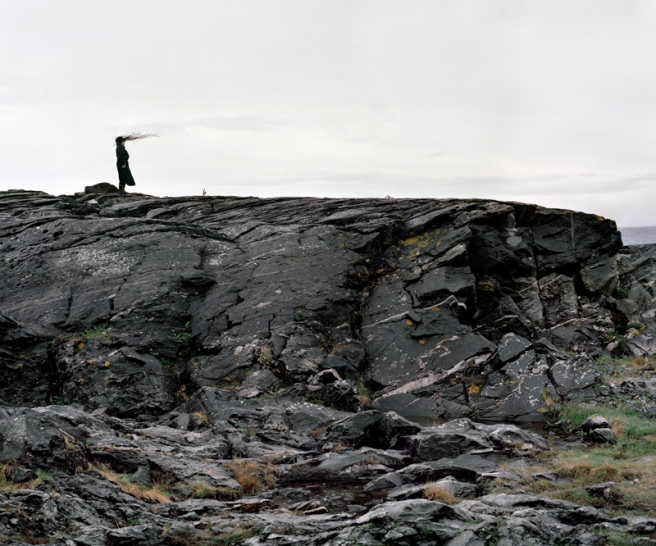
Today I am revisiting a book I haven’t read since college (though in college we called it a “text”), Edmund Burke’s On The Sublime and Beautiful. Despite it’s rather strange specificity (he devotes paragraphs to explaining why some colors evoke feelings of the sublime, while others do not, or why looking down from a great height feels more moving than gazing up at something equally tall) it feels appropriate for my current geographical situation.
A few hours ago, I crossed over the imaginary, human-delineated line into the arctic circle. I flew into Bodø and boarded an old 60’s cruise ship, which goes port-to-port all the way to Hammerfest. The weather is poor—rain, sleet, and some muculent snowflakes—and the waves are rough (I have fed myself enough dramamine to dizzy a whale) and the company is blue-haired and heavily accented, but I’m enjoying myself immensely despite all that. I’m reading a lot and staring at the ocean for extended stretches of time. I’ve thought about a lot of very stupid things but I’m trying my best to keep focused on more useful ideas or (gah, excuse the cliche) living in the moment. Sometimes, that second thing comes naturally, even for me, because certain emotions occupy the brain like hostile soldiers, leaving no room for dissent (or intrusive thoughts or niggling worries). Fear, even fear of vomiting from motion sickness, will do that. But so does astonishment, and I’ve felt a good deal of that in the past four hours. Burke explains the effects of astonishment like this:
The Passion caused by the great and sublime in nature, when those causes operate most powerfully, is astonishment; and astonishment is that state of the soul, in which all its motions are suspended, with some degree of horror. In this case the mind is so entirely filled with its object, that it cannot entertain any other, nor by consequence reason on that object which employs it. Hence arises the great power of the sublime, that, far from being produced by them, it anticipates our reasonings, and hurries us on by an irresistible force. Astonishment, as I have said, is the effect of the sublime in its highest degree; the inferior effects are admiration, reverence, and respect.
Mountains, whether I’m looking up at them or down from them, never fail to astonish me. Animals, too, can be astonishing. Later in his very thorough book, Burke grapples with four-legged things and the sounds they make:
Such sounds as imitate the natural inarticulate voices of men, or any animals in pain or danger, are capable of conveying great ideas; unless it be the well-known voice of some creature, on which we are used to look with contempt. The angry tones of wild beasts are equally capable of causing a great and awful sensation… It might seem that these modulations of sound carry some connexion with the nature of the things they represent, and are not merely arbitrary; because the natural cries of all animals, even of those animals with whom we have not been acquainted, never fail to make themselves sufficiently understood; this cannot be said of language. The modifications of sound, which may be productive of the sublime, are almost infinite. Those I have mentioned are only a few instances to show on what principles they are all built.
There haven’t been any polar bears in this part of Norway for a long time, but I still dream of seeing one. From a far distance, while I’m wearing an armored suit and holding a flare gun, just in case. Just look at these sexy beasts:

Anyway, I have to go now. They’re serving warm fish soup (“varm fiske suppe”) on the outdoor deck and I’m going to try to sneak a second portion.
Images by Jill Greenberg, an amazing photographer who somehow makes every piece look like a silky, rich painting. See more of her series “Ursine” here. Read the full text of A Philosophical Inquiry into the Origin of Our Ideas of The Sublime and Beautiful for free on Bartleby.com.





